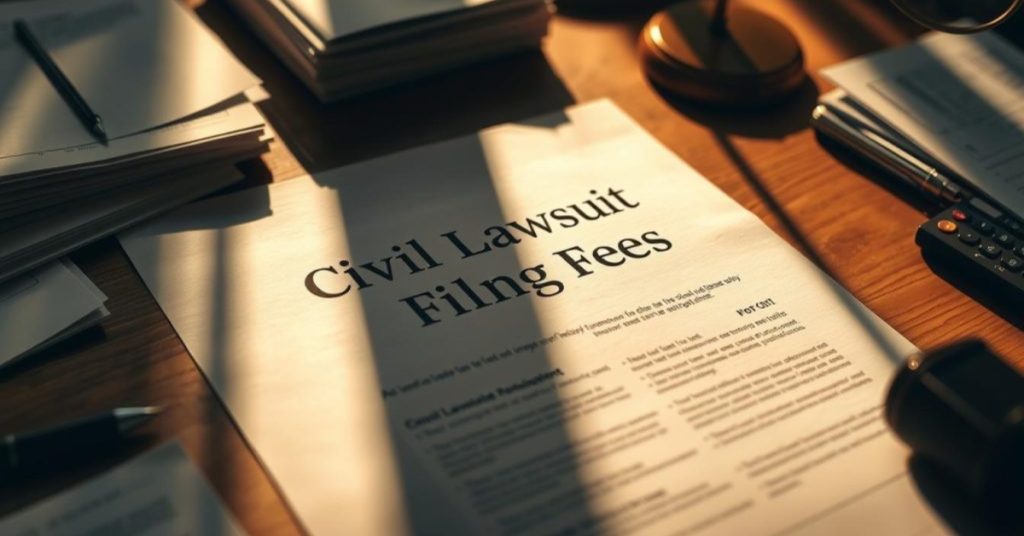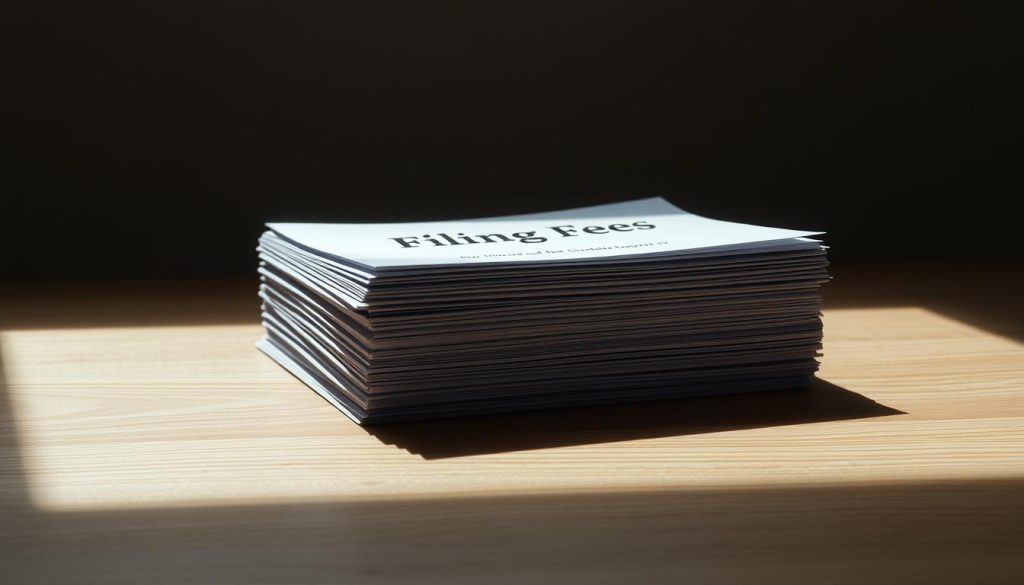
Filing a civil lawsuit can be expensive for both individuals and businesses. The fees for filing a lawsuit change based on where you are and the type of case. It’s important to know how much it costs to file a lawsuit to make a good choice.
When thinking about filing a lawsuit, remember to include all costs. This includes court fees, lawyer fees, and other expenses. Knowing these costs can help you plan better and make smart decisions. While filing a lawsuit can be costly, understanding the fees can help reduce the financial stress.
Introduction to Civil Lawsuit Costs
In this article, we’ll look at the usual costs of filing a civil lawsuit. We’ll cover the cost of filing and the fees for civil lawsuits. We’ll also talk about what affects these costs and offer tips on how to handle the process.
Key Takeaways
- Understanding the cost of filing a lawsuit is crucial to making an informed decision.
- Civil lawsuit filing fees vary widely depending on the jurisdiction and type of case.
- The cost of filing a lawsuit includes court fees, attorney fees, and other expenses.
- Knowing the typical costs associated with filing a civil lawsuit can help individuals and businesses navigate the process.
- Factoring in all associated expenses is essential to making informed decisions about how to proceed.
- The cost of filing a lawsuit can be a significant investment, but understanding the various fees and expenses involved can help mitigate the financial burden.
Understanding Civil Lawsuit Basics
To file a civil lawsuit, you need to know the basics of civil law. This includes understanding what a civil lawsuit is, the types of cases, and the first steps to take. Civil lawsuit expenses can be high, so knowing the process is key to making good decisions for your case.
A civil lawsuit is a legal fight between two or more people. It usually aims for money damages or other relief. The suing cost breakdown changes based on the case type, court fees, and legal help. Civil court fees are a big part of the cost, and knowing them helps prepare for the lawsuit’s financial side.

Before starting a lawsuit, it’s vital to know the different types of civil cases. These include personal injury, contract disputes, or property damage. Each case has its own needs and rules, helping you choose the right path for your situation.
Knowing the basics of civil law and the civil lawsuit expenses helps you make smart choices. It’s also crucial to think about the suing cost breakdown and civil court fees. This way, you’re ready for the financial side of filing a lawsuit.
How Much Does it Cost to File a Civil Lawsuit in Different Courts
Filing a civil lawsuit can cost a lot, depending on the court. Civil lawsuit filing fees can be hundreds or thousands of dollars. Other costs like court reporter fees, expert witness fees, and document prep can add up fast.
In general, civil litigation costs are higher in federal court than in state court. The case’s complexity and the court’s location also play a role. For instance, a case in a big city might cost more than one in a small town.
Several factors can influence the cost of filing a civil lawsuit:
- Court filing fees
- Attorney fees
- Expert witness fees
- Document preparation expenses
- Court reporter costs

It’s crucial to think about these costs before deciding to file a lawsuit. Knowing the lawsuit filing expenses and civil litigation costs helps make a better decision about your case.
Breaking Down Court Filing Fees
Court filing fees are a big part of the cost of filing a lawsuit. These fees change based on the court and the case type. Knowing the different fees helps estimate the legal fees for a civil case.
In the United States, civil court fees can be from a few hundred to several thousand dollars. You pay these fees to the court clerk when you file a complaint or legal documents. It’s key to include these costs when thinking about the cost of filing a lawsuit.
Several things can change court filing fees. These include the case type, the court’s location, and the number of defendants. Here are some important points to remember:
- State courts have different filing fees, which can be from $200 to $1,000 or more.
- Federal courts have a standard fee, but it can be waived in some cases.
- Small claims courts usually have lower fees, from $20 to $100.
By knowing the different court filing fees and what affects them, people can better guess the cost of filing a lawsuit. This helps them make smart choices about their legal options.
Attorney Fees and Legal Representation Costs
When thinking about how much does it cost to file a civil lawsuit, remember to include attorney fees and legal costs. These costs can greatly affect the total civil lawsuit expenses and lawsuit filing expenses. The price of hiring a lawyer varies based on the case’s complexity, location, and the lawyer’s experience.
To understand better, here are some common lawyer fee types:
- Hourly rates: Lawyers charge a fixed rate per hour worked on your case.
- Contingency fees: Here, the lawyer’s fee is a percentage of what you get from the settlement or judgment.
- Flat fees: Some lawyers charge a fixed fee for certain services, like drafting a contract or legal advice.
Finding the right lawyer is key to keeping lawsuit filing expenses low and getting a good outcome. Research and interview lawyers to find the best fit for your needs and budget. Knowing about different lawyer fees and choosing wisely can help manage your civil lawsuit expenses and lead to a successful case resolution.
Additional Expenses Beyond Filing Fees
When you think about civil lawsuit filing fees, remember other costs that come up in court. These can change the total civil litigation costs and suing cost breakdown. Knowing about these extra costs helps you make smart choices about your case.
Costs like court filing fees and lawyer fees are just the start. You might also pay for serving legal papers, making documents, and court reporters. It’s important to plan for these to avoid surprises.
Service of Process Costs
Service of process means getting legal papers to the other side. You can do this in person or by certified mail.
Document Preparation Expenses
Preparing legal documents like complaints and briefs costs money. If your case needs a lot of paperwork, these costs can add up fast.
Court Reporter and Transcript Fees
Court reporter fees and transcript costs are for recording and writing down what happens in court. These can be high, especially in long or complex cases.
Knowing about these extra costs helps you understand civil litigation costs better. It’s key to talk to a lawyer about these costs. They can help you figure out the best way to handle your case.
Cost-Saving Options and Fee Waivers
If you can’t afford the cost of filing a lawsuit, there are ways to save money. The civil court fees and legal fees for civil case can be high. But, there are steps you can take to lower these costs.
Many courts offer fee waivers or reductions for those who qualify. To get these, you must meet certain fee waiver eligibility requirements. These often include income limits or financial hardships.
Pro Bono Legal Services
Another option is pro bono legal services. These are free or low-cost legal help from qualified lawyers. They can be a big help if you can’t afford legal fees for civil case.
Legal Aid Resources
There are also legal aid resources to help you. These include non-profit groups, community clinics, and government programs. They can guide you through the legal system and help you find affordable legal help.
Some examples of cost-saving options and fee waivers include:
- Fee waiver programs for low-income individuals
- Pro bono legal services from qualified attorneys
- Legal aid resources, such as non-profit organizations or community clinics
Geographic Variations in Filing Costs
When thinking about how much does it cost to file a civil lawsuit, location matters a lot. Civil lawsuit expenses change a lot from state to state and even city to city. Knowing these differences is key to handling your case well.
The lawsuit filing expenses vary due to many factors. These include court fees, lawyer costs, and more. For example, some places charge more for filing civil cases than others. Here are some important points to remember:
- Different states have their own filing fee rules, which can change the cost of filing a lawsuit.
- City courts might have different fees than state or federal courts, affecting civil lawsuit expenses.
- Lawyer fees and other costs can also change based on where you are, impacting lawsuit filing expenses.
Knowing how filing costs vary by location can help you make a smarter choice. By looking at the costs in your area, you can prepare better for the financial side of things. This ensures you’re taking the best steps to protect your rights.
Timeline and Payment Considerations
Understanding civil lawsuit filing fees is key to handling the money side of filing a lawsuit. The cost of filing a lawsuit can be high. It’s important to know when to pay and what payment options are available. In the United States, the cost of filing a lawsuit changes based on the court and the case type.
The civil litigation costs include filing fees, lawyer fees, and other expenses. Knowing these costs and how to pay them is crucial. Some courts have payment plans to help with the cost of filing a lawsuit.
- When fees are due: Check with the court to determine when civil lawsuit filing fees are due and what the payment deadlines are.
- Payment methods accepted: Find out what payment methods are accepted by the court, such as cash, check, or credit card.
- Installment options: Determine if the court offers installment options or payment plans to help manage the cost of filing a lawsuit.
By understanding the timeline and payment considerations, individuals can better manage the financial aspects of filing a civil lawsuit. This helps make informed decisions about their case.
Conclusion: Making an Informed Decision About Filing a Civil Lawsuit
Filing a civil lawsuit can be complex and expensive. It’s important to know the different fees and costs involved. This article has given a detailed breakdown to help you decide.
Looking into ways to save money, like fee waivers or free legal help, can help. Also, knowing the timeline and how to pay can manage costs better. Getting professional legal advice is key to understanding the legal system and getting the best result for your case.
Before deciding to file a lawsuit, think about the costs, benefits, and future effects. With a clear understanding of the financial side, you can make a choice that fits your situation and goals.
FAQ
What constitutes a civil lawsuit?
A civil lawsuit is a legal fight between two or more sides. It seeks money or other relief. It’s different from a criminal case, which is about breaking the law.
What are the different types of civil cases?
There are many types of civil cases. These include personal injury, contract disputes, and employment law. Real estate and intellectual property disputes are also common.
What are the initial steps to take before filing a civil lawsuit?
Before starting a civil lawsuit, gather all important documents. Find the right court and think about the costs and benefits of legal action.
How much does it cost to file a civil lawsuit in state court?
Filing a civil lawsuit in state court can cost between $50 to $400 or more. This depends on the state and the case’s complexity.
What are the filing fees for a federal civil lawsuit?
The filing fee for a federal civil lawsuit is $350. Additional fees might apply for certain cases or services.
How much does it cost to file a small claims court case?
Filing a small claims case is cheaper. It usually costs between $20 to $100, depending on where you are.
What factors affect the cost of attorney fees for a civil lawsuit?
Attorney fees vary a lot. They depend on the case’s complexity, the lawyer’s experience, and where they are. Fees can also change based on whether the lawyer works by the hour or on a contingency basis.
What other expenses are involved in filing a civil lawsuit beyond court filing fees?
Other costs include service of process and document preparation. You might also need to pay for a court reporter, transcripts, and expert witness fees.
Are there any cost-saving options or fee waivers available for filing a civil lawsuit?
Yes, some people might qualify for fee waivers. Others can get free legal help or assistance from legal aid groups to lower the costs.
How do filing costs vary based on geographic location?
Filing costs change a lot based on where you are. This is because of different court fees and the cost of litigation in various places.